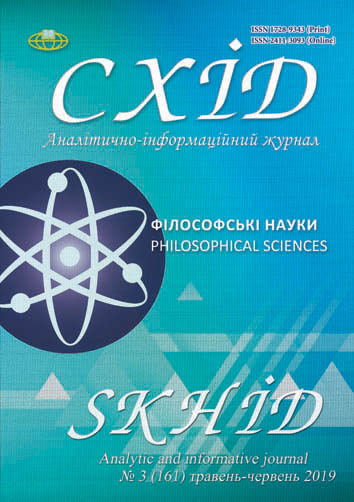Tandem of Populism and Post-truth as the background of development of the modern democracy in Ukraine
DOI:
https://doi.org/10.21847/1728-9343.2019.3(161).171989Keywords:
democracy, elections, populism, post-truth, memAbstract
Political science theories and concepts that describe the real political process have always been the empirical basis for political philosophy. According to the author, the 2019 Ukrainian presidential election campaign can best be understood and described using the concepts of “populism” and “post-truth”. The paper analyzes the discourse of the concept of “populism”, and reveals its content and main features. The need to establish social supervision over the actions of the authorities as a means of countering populism is emphasized. Essential characteristics of the post-truth phenomenon are revealed. The theoretical chain of the terms “verity” – “truth” – “post-truth” is presented. The meme as a unit of post-truth is analyzed. The paper proves that it was the bundle of populism and post-truth that had been the background of the electoral consciousness where the manipulative election technologies of the presidential campaign in Ukraine unfolded.Downloads
References
Fukuyama, Fransis (2019). Politychnyy poryadok i politychnyy zanepad. Vid promyslovoyi revolyutsiyi do hlobalazatsiyi demokratiyi (translat. from English). Kyiv: Nash format, 608 p. (In Ukrainian)
Abazi, H. (2017). On the background and the possible impact of epistemology on the emergence of the post of truth. Thesis No. 3, Retrieved from https://clck.ru/GpVvz (Accessed: 13.05.2018).
Kirkpatrick, A. (2017). Understanding in a post-truth world: comprehension and co-naissance as empathetic antidotes to post-truth politics. Cosmos and History: The Journal of Natural and Social Philosophy. Vol. 13, no. 3. P. 4-28. (In English)
Gellner, E. & Ionescu, G. (1969). Populism: It’s Meanings and National Characteristics. London: Weidenfeld and Nicolson, 347 p. (In English)
МacRae, D. (1969). Populism as an Ideology. Populism: Its Meanings and National Characteristics. London, Pp. 347. (In English)
Herasina, L. M. and Pohribna, V. L. and Polishchuk, I. O. and other. Trebin. M. P. (ed.) (2015). Politolohichnyy entsyklopedychnyy slovnyk. Kharkiv: Pravo, 816 p. (In Ukrainian)
Dodonov, D. (2017). Fenomen populizmu v suchasnomu politychnomu prostori. Hileya: naukovyy visnyk (Kyiv). Issue 123 (8). Pp. 287-292. (In Ukrainian)
Dawkins, Richard (2006). The Selfish Gene. Oxford University Press, USA; 3rd edition, April 24. Pp. 192. (In Ukrainian)
Bortnikov, N. A. and Pungina, A. P. (2017). Vizualnyy politicheskiy internet-mem kak instrument postpravdy. Politika postpravdy v sovremennom mire. St. Petersburg: Scythia-print, P.38-40. (In Russian)
Downloads
Published
How to Cite
Issue
Section
License
Copyright (c) 2019 Vira Dodonova

This work is licensed under a Creative Commons Attribution-NonCommercial-NoDerivatives 4.0 International License.
1. Authors bear responsibility for the accuracy of facts, quotations, numbers and names used.
2. Manuscripts are not sent back.
3. The publisher does not always agree with the authors' opinion.
4. The authors reserve the right to authorship of the work and pass the first publication right of this work to the journal under the terms of a Creative Commons Attribution-NonCommercial-NoDerivatives 4.0 International License. This license allows others to distribute (copy) the published work for non-commercial purposes, provided there is mandatory attribution to its authors and a link to the first publication in our journal.
5. The authors have the right to conclude separate supplement agreements that relate to non-exclusive work distribution in the form in which it has been published by the journal (for example, to upload the work to the online storage of the journal or publish it as part of a monograph), provided that the reference to the first publication of the work in this journal is included.

